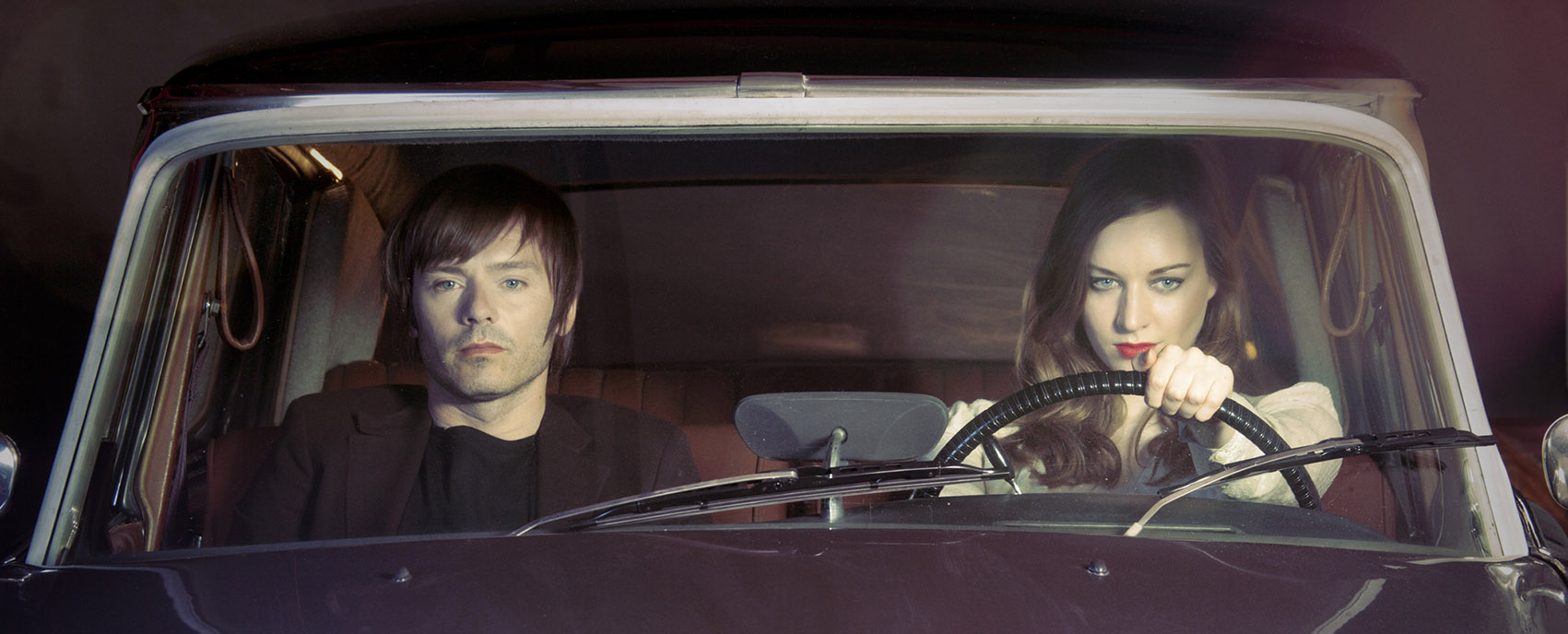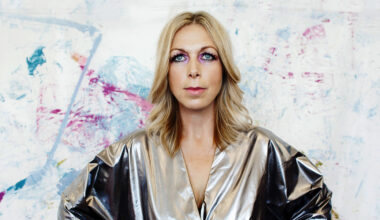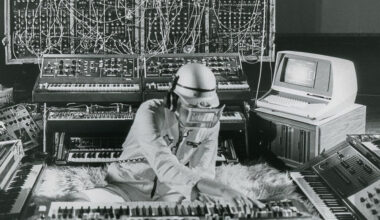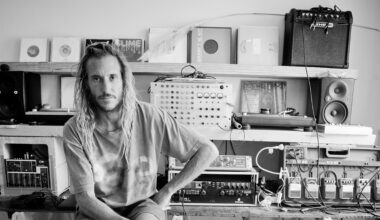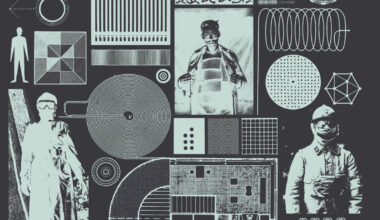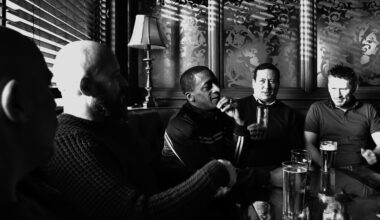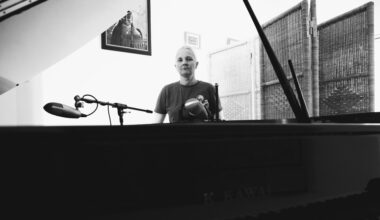Tomorrow’s World are Air’s Jean-Benoît Dunckel and ex-New Young Pony Club girl Lou Hayter. They’re named after the 1970s British TV technology programme and they’re capturing a forlorn nostalgia for a lost future
“What should I say? The truth or…”
This is Jean-Benoît Dunckel, half of Air, one of France’s finest musical exports, and now also half of a project called Tomorrow’s World, named after the British TV show about new inventions which, among many other futurist predictions, introduced many a 70s kid to the new sounds of Kraftwerk. JB’s partner in this venture is Lou Hayter, formerly of tearaway electronic scamps New Young Pony Club. Jean-Benoît, or JB as he is known, is answering my question about the handful of dates Tomorrow’s World undertook in the US last October. You know, like, “how did it go?”. Offered the choice between the truth or something more varnished, I plump for the former.
“Well,” he says, “it was difficult. We were playing festivals, it was not our audience, people are not waiting for you. The conditions were technicallyhard; many bands, you had to hurry up.” Oh, the joy of getting off the fame-and-fortune escalator and opting for the stairs the second time around. A rather different experience from touring with Air, then?
“Yes. In Air, I was treated like a king! When you are in a band like that, everybody is working for you and you are well-treated, but you sometimes forget what life is, what music is. You forget what your synth is, and what is setting up your gear, and to enter the machines to programme them… So I liked it a lot because it make me stay closer to the real music life. It was really necessary for me.”
JB’s voice is often accompanied with a sigh. Even when he laughs, which is fairly often, his laugh has a wistful tone. It’s as if he’s been hardwired for melancholy, like he occupies a benign but enveloping sadness. It’s part of what lies at the heart of Air’s appeal, and it’s in abundance on this beautiful album he’s made with Lou Hayter.
‘Tomorrow’s World’ often sounds like the soundtrack of a doomed romance, or of love derailing, or of unhealthy obsession. It also embraces ideas of newness and infatuation, and you couldn’t hope for a more attractive synth duo to project these emotional landscapes onto. JB’s cheekbones are the stuff of legend and Lou is not only a songwriter, synthesist and singer, but a fully signed up model, with London’s Premier Agency. She has, to paraphrase Martin Fry, got the look. It all seems so perfectly put together, but Tomorrow’s World isn’t, they insist, merely the realisation of a pre-planned temporary diversion.
“It wasn’t like I had the music and I was searching for a singer,” says JB. “I didn’t have any music, no concept. I don’t search for singers. I just search for someone I can have fun with, because being alone is quite boring actually. I want to do music with someone I feel complete with, somebody that can bring me ideas and fun, and has a point of view about making music, who can do something that I don’t know how to do. I met Lou and we decided to make music together, so we did it and it went well, and we never stopped.”
It went so well that Lou has quit the band she’s best known for, New Young Pony Club.
“It’s not a side project for me,” she says, “I’m focused on this. We’ve already written about half of the second album.”
And what about Air? Is Tomorrow’s World a side project for you, JB?
“It’s complicated,” he sighs, employing the language of the lover needing breathing space, if you’ll excuse the pun. “Air is not like a normal pop band. Air didn’t stop. But we are on a pause. We want to have experiences, musical experiences, we want to do something else. I don’t know what’s going to happen. I don’t know if Air is going to do another record or not, probably it will, but not now, because Tomorrow’s World is really important for me.”
You’ll excuse the impertinence, but this is all sounding quite a bit like you’ve agreed to see other people and your new lover is turning out to be more significant than you thought…
“Lou and I are not together,” says JB, laughing. “But being in a band, especially a musical duo, is a little bit like being in a love affair because it’s about feelings and your relationships and human behaviour. For example, with Nicol [Godin, of Air], it’s the same. We are also not together! But interacting with a human is quite complicated because of all the feelings and the egos and the pure artistic point of view of each other. Because sometimes your points of view do not match.”
“There’s a lot to play with, lyrically, being a girl and a boy in a band,” adds Lou. “We can do duets, we can play lovers in a song if we want to. In ‘Catch Me’, JB plays a predator who’s chasing me, or there’s ‘Think Of Me’, which is a lullaby sung by a man to a woman. So it’s a good tool to have in terms of songwriting. We have our relationship together, which helps us write songs, but I think we draw more from our relationships with our own partners. The songs aren’t really about us, apart from maybe the first one, ‘A Heart That Beats For Me’. I feel like that song represents us making a new start together. It has the phrase, ‘We do as we please’, and I thought that represented what we began doing, because it was the first song we wrote together, and we had a lot of freedom, we did whatever we wanted to do in the studio. It also it has the line, ‘Tomorrow is ours to win’, which ties in with the band name. So that song is about us in a way.”
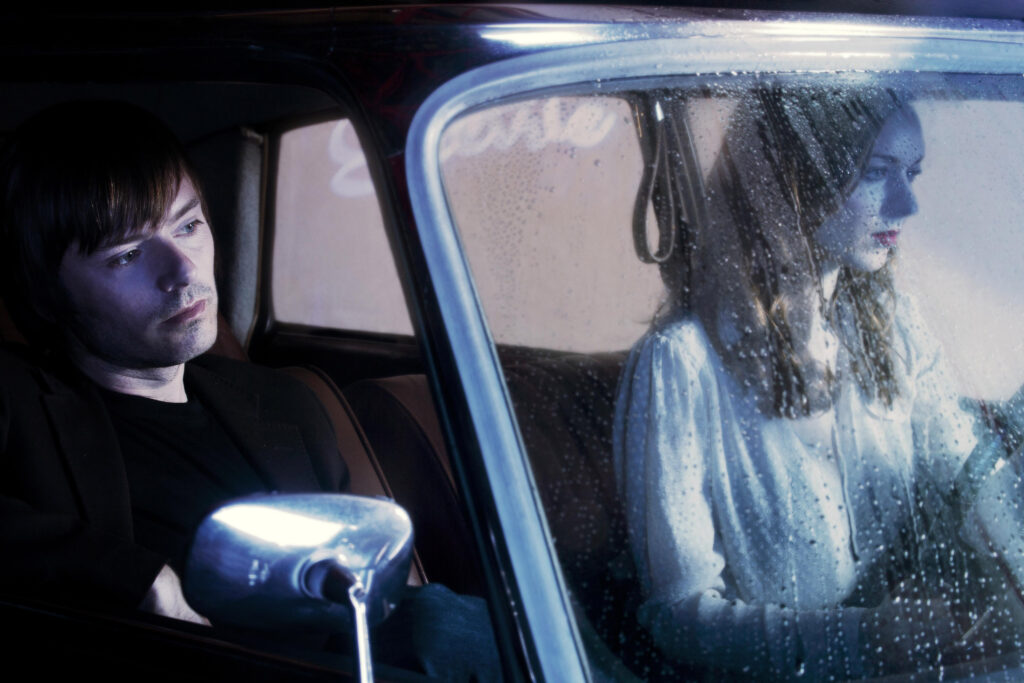
It’s not the only song on ‘Tomorrow’s World’ that represents a kind of reality. The aforementioned stalker song, ‘Catch Me’, which starts with frantic footsteps clattering through an underpass and a solitary queasy synth line, and features JB singing, “Don’t try to run, your time has come” in a sinister whisper, was rather unpleasantly echoed in a real-life episode that took place during its recording.
“We wrote it over the course of two days,” explains Lou. “On the second day, I was waiting near the studio, listening to the track on my headphones, trying to work out the rest of the lyrics, and while I was doing that a gang of kids pulled me onto the ground, put their hands over my eyes and took all my stuff.” Stoically, she chuckles at the memory. “Then I went back to the studio and carried on singing about how someone had been following me down the street. It was very eerie! I wondered if I’d summoned up some dark force. I stopped writing scary songs after that.”
“I felt so sorry for Lou,” says JB. “The studio is in Belleville in Paris, a sort of dodgy district. There are some dangerous kids in the street sometimes. Maybe it doesn’t happen to me because I am a boy, but when they see a girl like Lou, they are interested in doing horrible things. I hate violence.”
“I’m fine, though,” chirrups Lou reassuringly. “They didn’t hurt me. It was nice actually, because a guy ran after them and got my bag back. I had an hour to chill out and a cup of tea and got on with it.”
That’s the spirit, a quick cuppa and straight back to work.
“Paris is more scary than London, I think,” says JB. “French manners are not the same. In Paris, it’s very dodgy, a lot of homeless people, men have no manners, and when they see a woman they will say horrible things. It creates a lot of tension.”
If one track sums up the album, it might be ‘Pleurer Et Chanter’ (which translates as ‘Crying And Singing’). It’s a song that gradually becomes more and more beautiful as it progresses. Simple piano chords over a lo-res drum machine are joined by Air-esque strings and bass. Just when you think the sound can’t get any more sad, crystalline acoustic guitar starts up and the whole thing is sung in desperately romantic-sounding French. It’s a proper weeper.
“JB had to write the lyrics down and we went through them line by line,” says Lou. “It was quite painstaking and I made a lot of mistakes. I’ve been told my accent is OK, although I apparently do have an English accent.”
“The English accent sounds very charming,” notes JB with a smile. “If the accent is soft, it sounds mysterious and cool. Also a little posh.”
Lou laughs at this, as well she might given that she’s from Bromley and is, as she says herself, “definitely not posh.”
Listening to ‘Pleurer Et Chanter’, written entirely in the key of existential, you can almost see the raindrops falling slowly down a window pane being watched by a girl in her underwear and a T-shirt from inside her Parisian garret. And if you’re thinking it’s all sounding terribly Jane Birkin and Serge Gainsbourg, you wouldn’t be the only one. Drawing the parallel is irresistible, if a little crass.
“I’m not a heavy smoker and I don’t drink as much as Serge Gainsbourg,” laughs JB. “But it’s normal for people to think of other musical duos from the past. There is Serge Gainsbourg and Jane Birkin, but also Lee Hazlewood and Nancy Sinatra, and many other people. It’s easy to find a parallel. But it’s not the same times, so it’s not the same.”
Gainsbourg was always the overly assertive male, lascivious and domineering, and Birkin seemed like the passive object of his adoration. In Tomorrow’s World, it feels
like the female character has the strength.
“I think we both have strengths in this band,” says Lou. “But it’s definitely more interactive. The impression I got was that Serge called the shots and masterminded it all, whereas this is more like a band. We’re both involved in everything together.”
The perfectly tuned futurist nostalgia of ‘Tomorrow’s World’ relies in part on lyrics about leaving things behind, about forging into the future and creating new lives.
“It’s really important for me,” affirms JB. “It’s a concept I apply to my life now: to not being too much touched by things of the past. The human brain is built to react to the past, but it’s not always true that we can progress and find new things and have a better life by searching into our past. I think that sometimes it is good not to think too much, and to forget people and things that have happened to us, and to imagine something else instead, to stay in your imaginations and in your wishes and your magic world, which can be sometimes totally unreal and not doable… but it’s so good to have dreams.”
When asked about the future of Tomorrow’s World, JB is philosophical. “Things are going to move in the direction that people, music fans, want them to. It’s an inspiration, it’s a spirit, and I just follow the spirit. I don’t know where we go, I never knew where I was going actually, even with Air. I never knew what would happen next, because… you never know.”
‘Tomorrow’s World’ is out on Naive Records
